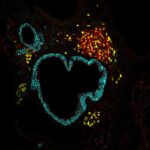
Publication: Caspase-dependent immunogenicity of doxorubicin-induced tumor cell death A novel dendritic cell subset involved in tumor immunosurveillance
Published in: Nature Medicine, 2006, 12 (2), pp.214-219. ⟨10.1038/nm1356⟩
Authors: Julien Taieb, Nathalie Chaput, Cédric Ménard, Lionel Apetoh, Evelyn Ullrich, Mathieu Bonmort, Marie Péquignot, Noelia Casares, Magali Terme, Caroline Flament, Paule Opolon, Yann Lecluse, Didier Métivier, Elena Tomasello, Eric Vivier, François Ghiringhelli, François Martin, David Klatzmann, Thierry Poynard, Thomas Tursz, Graça Raposo, Hideo Yagita, Bernard Ryffel, Guido Kroemer, Laurence Zitvogel
Summary
Systemic anticancer chemotherapy is immunosuppressive and mostly induces nonimmunogenic tumor cell death. Here, we show that even in the absence of any adjuvant, tumor cells dying in response to anthracyclins can elicit an effective antitumor immune response that suppresses the growth of inoculated tumors or leads to the regression of established neoplasia. Although both antracyclins and mitomycin C induced apoptosis with caspase activation, only anthracyclin-induced immunogenic cell death was immunogenic. Caspase inhibition by Z-VAD-fmk or transfection with the baculovirus inhibitor p35 did not inhibit doxorubicin (DX)-induced cell death, yet suppressed the immunogenicity of dying tumor cells in several rodent models of neoplasia. Depletion of dendritic cells (DCs) or CD8+T cells abolished the immune response against DX-treated apoptotic tumor cells in vivo. Caspase inhibition suppressed the capacity of DX-killed cells to be phagocytosed by DCs, yet had no effect on their capacity to elicit DC maturation. Freshly excised tumors became immunogenic upon DX treatment in vitro, and intratumoral inoculation of DX could trigger the regression of established tumors in immunocompetent mice. These results delineate a procedure for the generation of cancer vaccines and the stimulation of anti-neoplastic immune responses in vivo.
Link to HAL – hal-04960068
Link to DOI – 10.1038/nm1356

